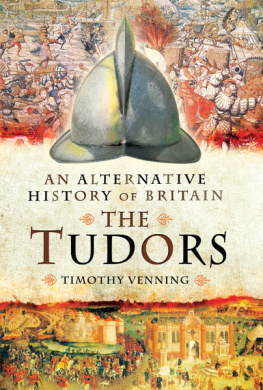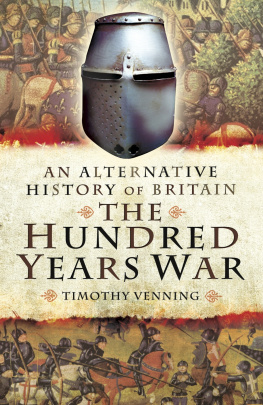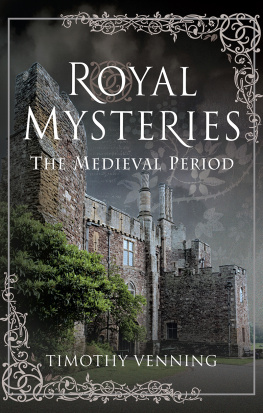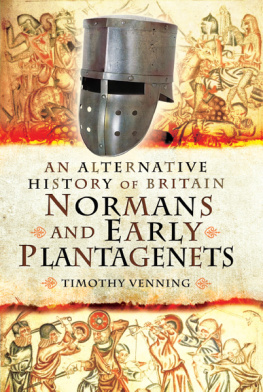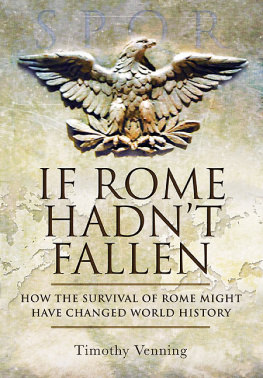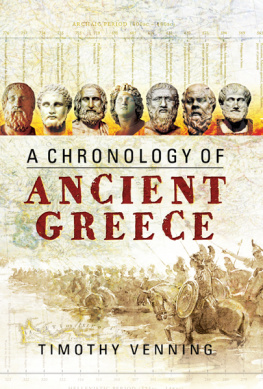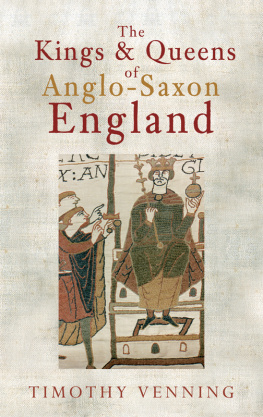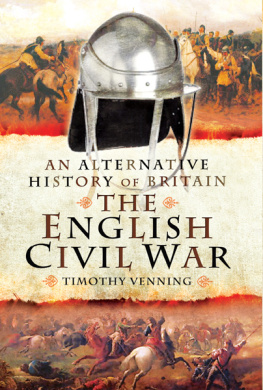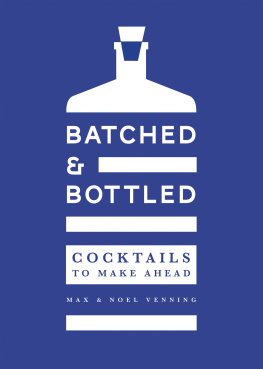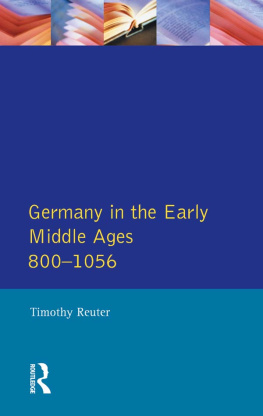First published in Great Britain in 2014 by
Pen & Sword Military
an imprint of
Pen & Sword Books Ltd
47 Church Street
Barnsley
South Yorkshire
S70 2AS
Copyright Timothy Venning 2014
HARDBACK ISBN: 978-1-78346-272-8
PDF ISBN: 978-1-47383-660-0
EPUB ISBN: 978-1-47383-484-2
PRC ISBN: 978-1-47383-572-6
The right of Timothy Venning to be identified as Author of this Work
has been asserted by him in accordance with the Copyright, Designs and
Patents Act 1988.
A CIP catalogue record for this book is available from the British Library.
All rights reserved. No part of this book may be reproduced or transmitted in
any form or by any means, electronic or mechanical including photocopying,
recording or by any information storage and retrieval system, without
permission from the Publisher in writing.
Typeset in 11pt Ehrhardt by
Mac Style, Bridlington, E. Yorkshire
Printed and bound in the UK by CPI Group (UK) Ltd, Croydon, CRO 4YY
Pen & Sword Books Ltd incorporates the imprints of Pen & Sword
Archaeology, Atlas, Aviation, Battleground, Discovery, Family History,
History, Maritime, Military, Naval, Politics, Railways, Select, Transport,
True Crime, and Fiction, Frontline Books, Leo Cooper, Praetorian Press,
Seaforth Publishing and Wharncliffe.
For a complete list of Pen & Sword titles please contact
PEN & SWORD BOOKS LIMITED
47 Church Street, Barnsley, South Yorkshire, S70 2AS, England
E-mail:
Website: www.pen-and-sword.co.uk
Contents
Chapter One
What if the early Tudors had not had such dynastic bad luck?
Politics, biology, and chance from 1485 to 1547
Prince Arthur, 1502: the second loss of a potential King Arthur II
A multitude of healthy, competing adult royal sons had its own political problems for a dynasty, as seen by the struggles among Edward IIIs sons and grandsons in the latter years of his reign and after his death. Edward IVs two brothers were a perennial problem once they were adult, one assisting his overthrow and both threatening the rights of his sons to succeed. Henry VIIs relatively small family did not immediately present problems for the succession. He and Elizabeth of York had had three sons, of whom one (Edmund, born 1499) died as an infant as had Edward IVs third son, George. But his eldest son, Arthur, died young at fifteen in April 1502, a few months after his marriage to Catherine of Aragon. The Prince of Wales was apparently delicate, and was less robust-looking than his surviving brother, Henry; it is uncertain if his health was the real reason for the delay in his marriage or in his being kept at court and not sent off to preside over the Council of the Marches at Ludlow as early as his predecessor Edward V had been. Edward had left court at three; Arthur left at six; the next Prince(ss), Mary, left for Ludlow at eleven.
Arthurs sudden death whether or not of the tubercular tendency that threatened generations of Tudors and accounted for both Henry VIIIs sons in their teens was unexpected and followed within months of his marriage, leaving the King with one son. (Even if the Kings third son, Edmund, born in 1499, had lived he would have been too young to be of use for many years.) The obscure sweating sickness that accounted for Arthur, involving a high temperature and kidney failure, may have been fatally exacerbated by a weak constitution and his decline took weeks; he was likelier to have ruled in the more cautious mould of his father. This need not have led to avoidance of bold foreign policy-decisions such as the French war of 151213, where the vigorous Henry VIII was apparently restless to emulate Henry V in conquering France and led his troops in person, and his health might have permitted a French expedition on the cautious lines of his fathers invasion of France in 1492. The circumstances of Franco-Spanish/Habsburg rivalry in the 1510s would have been the same for Arthur as for Henry. But Henry was to be well-known for handing the minutiae of political and administrative business over to his ministers in the first two decades of his reign, in which Thomas Wolsey proved to be his indispensable man of business. Henry was more conscientious than has been allowed for in myth, and Wolsey anticipated rather than pre-empted his decisions; his skill lay in relieving the King of tedious business without seeming to encroach on his prerogative. Henry VIIs leading clerical adviser, Bishop Fox, was ageing by 1509, and Foxs protg Wolsey might well have made himself indispensible to Arthur too. But Arthur would probably have spent less time and energy on physical sports, with there being no evidence that (health aside) he was at all interested in hunting or the tournament by the age of fifteen. A more sedentary and bookish ruler was more likely to have been involved in Council work in his twenties to a degree that Henry was not, with a lesser chance that quantities of business would be delegated to one minister. Certainly Arthur is unlikely to have been as shameless as Henry, already an idiosyncratic and ruthless personality, in sacrificing his fathers ministers Empson and Dudley to the wrath of the higher-born peers from whom they had been extorting money on Henry VIIs behalf.
Henrys decline in health does not seem to have been noticeable until 1508, except for one serious illness in 1503; however it seems that he was withdrawing more into his inner chambers and access to him was controlled by men such as Empson and Dudley, which may imply that he was losing his confidence. But if Henry had had a semi-adult and serious Arthur available for support, not the (five years) younger and joust-loving Prince Henry, could he have started to induct his heir into administration by the mid-late 1500s? Or would the emergence of the Prince have led to courtiers opposed to the low-born favourites turning to him to try to influence the King?
The trend in international politics by 1509 was for the consolidation of the Tudor alliance with Ferdinand of Aragon (regent of Castile) and Emperor Maximilian against Louis XII of France, with the two rulers joint heir Charles (Emperor Charles V) as destined husband of Henry VIIs daughter, Mary; this was likely to have continued whether Henry VII or Arthur was king in the years after 1509. In that case, the marriage of Prince Henry to a Habsburg princess was the next logical dynastic move. Assuming Henry VIII and his Habsburg wife to have been less unlucky in childbirth than Catherine of Aragon, who would have stayed as Arthurs queen, and Catherine to have had no luck by Arthur either, Henry VIII might still have been king after Arthur c.151520 and had no difficulties over the lack of a male heir in the 1520s.
The rocky road to the marriage of Henry VIII and Catherine of Aragon: could it have been abandoned?
The marriage of Henry VIII to a wife six years his senior was ultimately the result of the political situation of England after 1485, where his father had been courting the alliance of her parents Ferdinand and Isabella. What were the alternative sources of a wife for his brother Arthur and thus him in the 1490s? No English alliance with their long-term foe France was secure, given the competition between the two mistrustful powers over the lost English domains in France and the surviving claim of the English sovereigns to the throne of France, which Henry V had successfully revived in 141522. Charles VIIIs regency had backed Henry Tudor against Richard III in 14845, giving him sanctuary and troops when he had to flee from Brittany; but it was normal French policy to stir up trouble against a strong and militaristic English king who might invade. Louis XI had backed the refugee Queen Margaret of Anjou (a Frenchwoman, and Louis cousin) against Edward IV in the 1460s, and Richard III was a threat to France as he had strongly opposed Edwards abandonment of the invasion of France when Louis bought him off at Picquigny in 1475.
Next page
